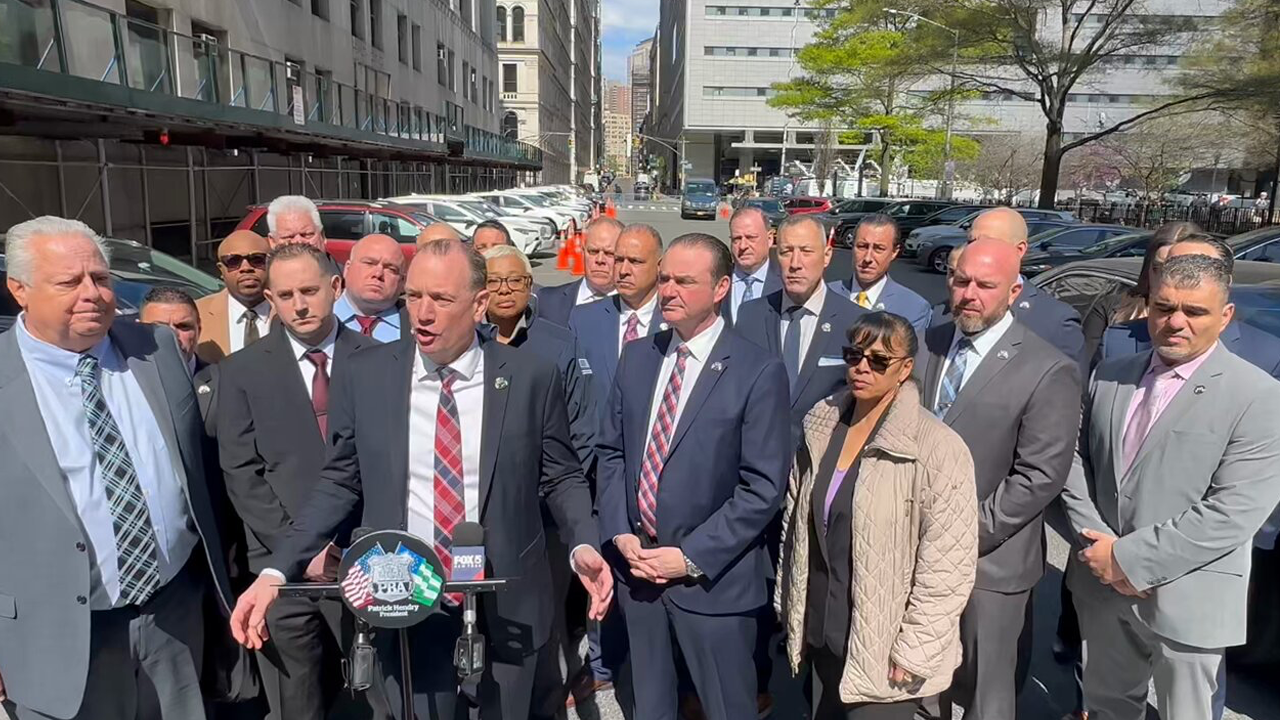After pressing for abortion restrictions, Arizona Republicans distance themselves from a state Supreme Court ruling on a 160-year-old ban. The ex-assistant principal of a Virginia school where a 6-year-old student shot his teacher is charged. And the EPA limits ”forever chemicals” in drinking water.
Here’s what to know today.
Arizona Republicans distance themselves from ruling on near-total abortion ban
Arizona Senate candidate Kari Lake, pictured above, once called a Civil War-era statute outlawing nearly all abortions in the state “a great law.” But after the Arizona Supreme Court’s ruling to uphold that law, she said it was “out of step with Arizonans.”
She also took the chance to voice her support of former President Donald Trump’s stance on abortions. (Earlier this week, Trump said the issue should be left up to states to decide.) The issue of abortion, she said, is “very personal” and “should be determined by each individual state.”
Lake wasn’t the only Republican in the state who was critical of the ruling. Rep. David Schweikert, who once wrote on X that he was “pleased” with the fall of Roe v. Wade, said abortion “should be decided by Arizonans, not legislated from the bench.” Fellow Rep. Juan Ciscomani, who like Schweikert is locked in a competitive re-election race, said the ruling was a “disaster for women and providers.”
This is Morning Rundown, a weekday newsletter to start your morning. Sign up here to get it in your inbox.
Another GOP state representative, Matt Gress, said he didn’t support the ruling. “I cannot and will not condemn women, especially the victims of rape and incest, to be forced to carry their pregnancy to term.”
The 1864 law that the state Supreme Court upheld yesterday outlaws abortion from the moment of conception but includes an exception to save the woman’s life. The law was never repealed, and last year, an appellate court ruled that it could remain on the books as long as it was “harmonized” with a 2022 law. The state Supreme Court’s decision this week effectively undoes the lower court’s ruling that a more recent 15-week ban from 2022 superseded the 1864 law.
The Arizona Supreme Court said it would put its decision on hold for 14 days so that a lower court could consider “additional constitutional challenges” that haven’t yet been cleared up.
Read the full story here.
More abortion coverage:
- President Joe Biden has repeatedly said that if re-elected, he would make Roe v. Wade protections the law of the land. In reality, he would have to clear a litany of hurdles to make that happen.
- Vice President Kamala Harris will travel to Arizona at the end of the week.
- Biden’s campaign was ready to pounce after Trump released a video about his abortion stance. Now it has more plans after Arizona’s near-total abortion ban was upheld.
- Trump is learning the hard way that there is no middle ground on abortion inside the Republican Party, NBC News chief political analyst Chuck Todd writes in an analysis.
Inflation’s grip on Americans persists
If you felt like prices were higher last month, you’re likely not alone. This morning, the Bureau of Labor Statistics will report inflation readings for the month of March. The figures are expected to show that inflation was at 3.5%, up from 3.2% in February. Excluding food and energy, which represent commodities with more volatile prices, the so-called core reading is expected to have declined slightly, from 3.8% to 3.7%.
The Federal Reserve is still targeting a 2% inflation rate, but economists say it will take time for inflation to truly subside. That mindset is a shift from the start of the year, when the consensus forecast was for economic growth to slow so that the Fed can start to cut interest rates. Now, there are doubts about when and how often officials will cut interest rates this year. For now, economists say, the best consumers can hope for is that prices stop going up so fast.
Biden calls Netanyahu’s handling of Israel-Hamas war ‘a mistake’
In the early days after the Oct. 7 attack on Hamas, President Joe Biden repeatedly said that his support for Israel was “ironclad.” But that support has become more shaky, an attitude that was on display in a new interview with Univision. “I think what he’s doing is a mistake,” Biden said in response to a question about whether Israeli Prime Minister Benjamin Netanyahu is more concerned about political survival than Israelis’ national interest.
But, in the interview, Biden didn’t indicate any significant changes in U.S. policy toward its ally. Recently, he has come under criticism for not backing up his comments with conditions on selling U.S. arms to Israel. Read more about Biden’s interview here.
Meanwhile, during a Senate committee hearing focused on Biden’s latest budget request, Defense Secretary Lloyd Austin said the U.S. has seen no evidence that Israel has committed genocide in its military operations against Hamas in Gaza.
Prestigious Dana-Farber Institute retracts multiple studies
A leading cancer research institute roiled by allegations of errors and image manipulation in its papers has retracted seven studies over the past two months. The issue came to light earlier this year, after microbiologist and volunteer science sleuth Sholto David posted a scathing post on his blog. In a statement, the Dana-Farber Institute’s integrity research officer said that the institute “is deeply committed to a culture of accountability and integrity” and that it prioritizes transparency. In addition to the seven redacted papers, the institute asked for corrections in 31 papers.
Elisabeth Bik, a microbiologist and longtime image sleuth, said the controversy is “unusual, but that’s how it should be.” She reviewed several of the papers’ retraction statements and scientific images for NBC News. The errors, she said, were serious and the manipulated photos suggested there were “signs of misconduct.”
The retractions and new allegations add to a larger, ongoing debate about how to protect scientific integrity and reduce incentives that could lead to misconduct or unintentional mistakes in research. They also offer additional evidence for what some scientific sleuths have been concerned about for years.
Ex-principal at school where student shot teacher charged

The former assistant principal at a Virginia elementary school where a 6-year-old student shot his teacher has been indicted on child abuse charges, according to court records filed yesterday. Ebony Parker faces eight counts related to the day of the shooting. Each carries a maximum sentence of five years in prison.
The charges against Parker come more than a year after first-grade teacher Abigail Zwerner was intentionally shot by one of her students at Richneck Elementary School in Newport News. Zwerner filed a lawsuit after the shooting alleging that school district administrators failed to listen to multiple warnings from staff members and students that the child had a handgun. A lawyer for Deja Taylor, the mother of the child who was sentenced to two years on a charge of felony child neglect, said this week’s charges represent a new frontier in school gun-violence-related prosecution.
New limits on ‘forever chemicals’ in drinking water
The Environmental Protection Agency estimates that new limits on “forever chemicals” in drinking water will prevent thousands of deaths and tens of thousands of serious illnesses. This morning, the agency announced national limits for six types of per- and polyfluoroalkyl substances in drinking water. You may know those substances as PFAS, or “forever chemicals,” which got their name because they barely degrade and are nearly impossible to destroy. Most people in the U.S. have PFAS in their blood, the Health and Human Services Department said.
Under the new limits, two types of “forever chemicals” used in nonstick or stain-resistant products such as food packaging cannot exceed 4 parts per trillion in public drinking water. And three additional PFAS chemicals will be restricted to 10 parts per trillion. More on what that means here.
Eleven states already have regulatory standards for PFAs in drinking water. Under the new rules, public water systems that don’t monitor for PFAS will have three years to start.
Politics in Brief
Mayorkas impeachment probe: Republicans delayed an impeachment trial for Homeland Security Secretary Alejandro Mayorkas so GOP senators can consider ways to make the process painful for Democrats.
Trump trials: A New York appeals court judge denied Donald Trump’s bid to halt his hush money trial while he appeals a gag order. And the judge in Trump’s classified documents case handed prosecutors a partial victory by granting their request to keep the names of government witnesses sealed.
Difficult path forward: Senate Republicans are prepared to sink $78 billion bipartisan bill to expand the child tax credit and provide breaks for businesses, issuing a series of demands that would most likely disrupt the coalition that enabled it to pass in the House.
Congress: A bipartisan group of lawmakers is introducing legislation to combat the rise of antisemitism.
2024 election: Biden is building a behemoth of a campaign, scooping up record-making donations and expanding his campaign operation in battleground states. Trump, at this point, seems to be playing catch-up, as he and his team bet on a different path to victory.
Want more politics news? Sign up for From the Politics Desk to get exclusive reporting and analysis delivered to your inbox every weekday evening. Subscribe here.
Staff Pick: The beat goes on — under very specific conditions

Unless you’re a DJ or finding the perfect song to match your running pace, it’s unlikely you’ve thought much about beats per minute. In Chechnya, that’s about to change — in an attempt to make music comply with “Chechen mentality,” any songs with a BPM above 116 or below 80 have been banned. That means hits like ‘Hey Jude’ (too slow) and ‘Single Ladies’ (too fast) are out. ‘Anti-Hero,’ though, is right at the sweet spot with 97 BPM. — Annie Hill, platforms editor
In Case You Missed It
- Missouri inmate Brian Dorsey was executed in the 2006 murders of his cousin and her husband, despite dozens of prison staffers’ efforts to save his life.
- Police say a Los Angeles woman fatally stabbed her partner and possibly threw her two children from a moving SUV onto a busy highway before she killed herself by crashing into a tree.
- A new study suggests that taking acetaminophen during pregnancy is not associated with an increased risk of autism and ADHD in children, contrasting some previous research.
- Police in Akron, Ohio, released video of an officer shooting a 15-year-old boy who was holding what his family said was a toy gun.
- James and Jennifer Crumbley, the first parents to ever be charged, then convicted, in their child’s mass shooting at a U.S. school, were both sentenced to 10 to 15 years in prison.
Select: Online Shopping, Simplified
When organizing your closet, experts say to consider the items you use most often and how much space you have to work with. Here are 33 best organizers, from shelving to racks to bins, to help get the job done.
Sign up to The Selection newsletter for exclusive reviews and shopping content from NBC Select.












